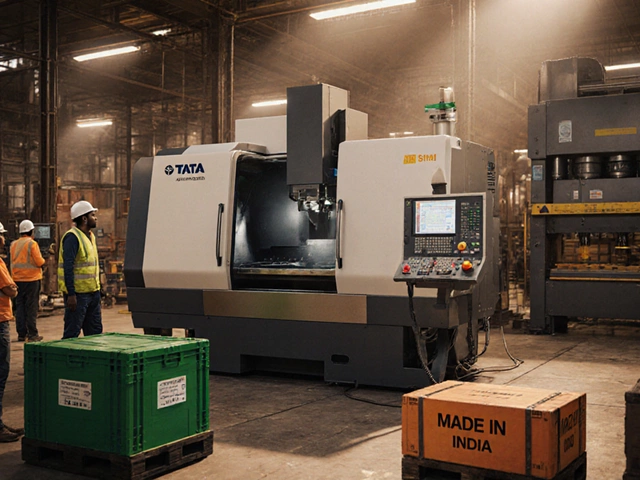Bangalore, often dubbed the 'Electronic City,' didn't get this title by chance. If you've ever wondered what makes this city a powerhouse in electronics manufacturing, you're in the right place. Once a city known for its pleasant weather and gardens, Bangalore transformed remarkably into a tech and electronics hub. But how did it happen?
The journey began with the establishment of the Electronics City as an industrial park. This visionary move set the stage for Bangalore's technological journey, attracting massive investments and tech companies. It's not just about having big buildings and tech parks, though. The city's evolution involves a blend of smart planning, government policies, and a workforce that’s always ready to learn and innovate.
- The Birth of an Electronic Hub
- Infrastructure and Workforce
- Key Players and Industries
- Future Prospects
The Birth of an Electronic Hub
How did Bangalore, also known as Bangalore, get its nickname as the 'Electronic City'? Well, the journey started back in the early 1970s. The Indian government, realizing the potential of the IT industry, decided to build a massive industrial park purely dedicated to tech and electronics. This place, of course, became the famous Electronics City we all know today.
Strategic Investments and Visionary Planning
The strategic planning initiated by the Karnataka State didn't stop at building a tech park alone. Over 330 acres were dedicated to creating an environment where technology and electronics could flourish. This attracted not just national companies but also international giants like HP and Texas Instruments. Their presence brought a wave of employment opportunities and set off a chain reaction that put Bangalore on the map.
Government Policies and Incentives
The local government played a critical role in supporting this growth by providing policies that facilitated business operations. Simple things like tax benefits and easy license policies made it progressively simpler for businesses to set up shop and thrive. It’s like they rolled out the red carpet for companies wanting to innovate and produce in India.
Education and Infrastructure
Bangalore also boasts of educational institutions that churn out thousands of tech graduates every year. The constant supply of skilled labor was a crucial factor in keeping industries interested in investing here. With a blend of excellent infrastructure and a pool of intellectual talent, this city seemed to have everything going in its favor.
By the Numbers
Fast forward to today, Bangalore isn't just an industrial park—it's a bustling city that has redefined India's place in global electronics manufacturing. It's estimated to house over 200 tech companies, contributing significantly to India's GDP. The combination of these strategic decisions made decades ago is undoubtedly the bedrock of Bangalore's success as an electronics manufacturing epicenter.
Infrastructure and Workforce
When people talk about Bangalore as an 'Electronic City,' one of the biggest reasons is its robust infrastructure. The city isn't just about shiny tech parks—though they’re cool and all—it's about having the right facilities at the right places.
The Electronics City, at the heart of it all, is home to over 200 IT and electronics companies. It's well-equipped with state-of-the-art buildings, uninterrupted power supply, and high-speed internet. Imagine trying to run a tech company without these—pretty much like trying to run before you walk, right?
And it's not like the city stands still. Continuous improvements are made to ensure that infrastructure keeps pace with the rapidly evolving tech landscape. The Metro rail system, for example, keeps getting better, connecting far-flung corners of the city with major tech hubs. This makes commuting easier for the massive workforce.
Skilled Workforce
Now, on to the folks who really make it happen—the people. Bangalore boasts a remarkable pool of skilled professionals. It's like every other person you bump into is a tech whiz or a budding entrepreneur! This is largely thanks to its many engineering colleges and technical institutes.
Fresh graduates from institutions like the Indian Institute of Science and the Indian Institutes of Technology pour into the industry every year, ready to put their skills to the test. It’s not just about having degrees, though. Continuous training programs and workshops keep professionals updated with the latest in electronics and tech innovations.
The Role of Ecosystem
A supportive ecosystem plays a significant role too. Startups, big companies, and educational institutions often collaborate, creating an enriching environment that fuels innovation. This close-knit ecosystem means opportunities for networking, learning, and, importantly, growing. Companies don’t just sit and hope for innovation—they actively create conditions that allow it to flourish.
As Bangalore continues its journey as a leading hub for electronics manufacturing, the combination of solid infrastructure and a talented workforce ensures the city isn’t giving up its title anytime soon.

Key Players and Industries
When talking about Bangalore as an Electronic City, you can't miss diving into the impressive lineup of companies and industries that make it tick. Well-known giants like Infosys, Wipro, and TCS are among the pioneers that set up shop here, paving the way for a tech revolution. But the electronics story doesn't stop there.
Bangalore's landscape of electronics manufacturing has been enriched by a bunch of innovative startups and mid-sized companies. Think about companies like Tejas Networks and Bharat Electronics Limited (BEL) - they've been crucial in shaping the electronics production game in India. They produce everything from telecommunications equipment to defense electronics.
The Role of Multinationals
Global companies have always eyed Bangalore for its strategic advantage. Big players like IBM and Texas Instruments have long established their research and development centers, leveraging the city's innovation ecosystem. This influx of intellectual capital and investment has been a massive boost for the industry.
Manufacturing Hubs and Special Zones
Not to be overlooked, the city hosts several specialized zones, dedicated to electronics manufacturing. The Electronic City, nestled in the south of Bangalore, stands out as one of India's largest tech parks. You'll find a mix of well-known IT firms, cutting-edge startups, and local talents collaborating to push the boundaries of technology.
Education and Talent
Bangalore's tech triumph isn't just about companies. The educational backbone consisting of premier institutions like the Indian Institute of Science (IISc) and various engineering colleges churns out talented individuals who are ready to tackle the challenges of the tech world.
Together, these key players and industries create a robust environment for Bangalore, earning its title as an Electronic City. They're not just meeting the demands of the present but also setting the stage for a promising future in the ever-evolving world of technology.
Future Prospects
So, what's next for Bangalore, the 'Electronic City'? It's pretty exciting to think about, given its solid foundation and ever-evolving tech landscape. As we look ahead, the city's role in electronics manufacturing isn't just going to rest on its laurels. Instead, it promises even more advancements and opportunities.
Bangalore is eyeing growth in emerging tech areas like AI, IoT, and 5G. The demand for faster, smarter, and more efficient devices is skyrocketing, and Bangalore's tech ecosystem is gearing up to meet that need. Notably, local startups and global players alike are investing in research and development, ensuring continued innovation.
Policy and Investment
You may wonder how Bangalore keeps up the momentum. Well, supportive government policies play a part. Recently, initiatives to improve skill development and incentives for startups have encouraged even more tech ventures to set root in the city.
"Bangalore's ability to adapt to tech trends and foster innovation makes it a pivotal contributor to India's electronics sector," notes Dr. Anjali Rao, a leading analyst in the IT industry.
The Workforce of Tomorrow
Let's not forget the skilled workforce. Educational institutions are ramping up programs focused on electronics and tech, ensuring that the talent pipeline remains robust. This workforce, known for its adaptability and creativity, is one of the city's crowning jewels.
As you can see, Bangalore's future as an electronics hub looks brighter than ever. With tech integration into everyday life only increasing, the city's strategic initiatives, policies, and talent promise to keep it at the forefront of the electronics manufacturing scene in India and beyond.






